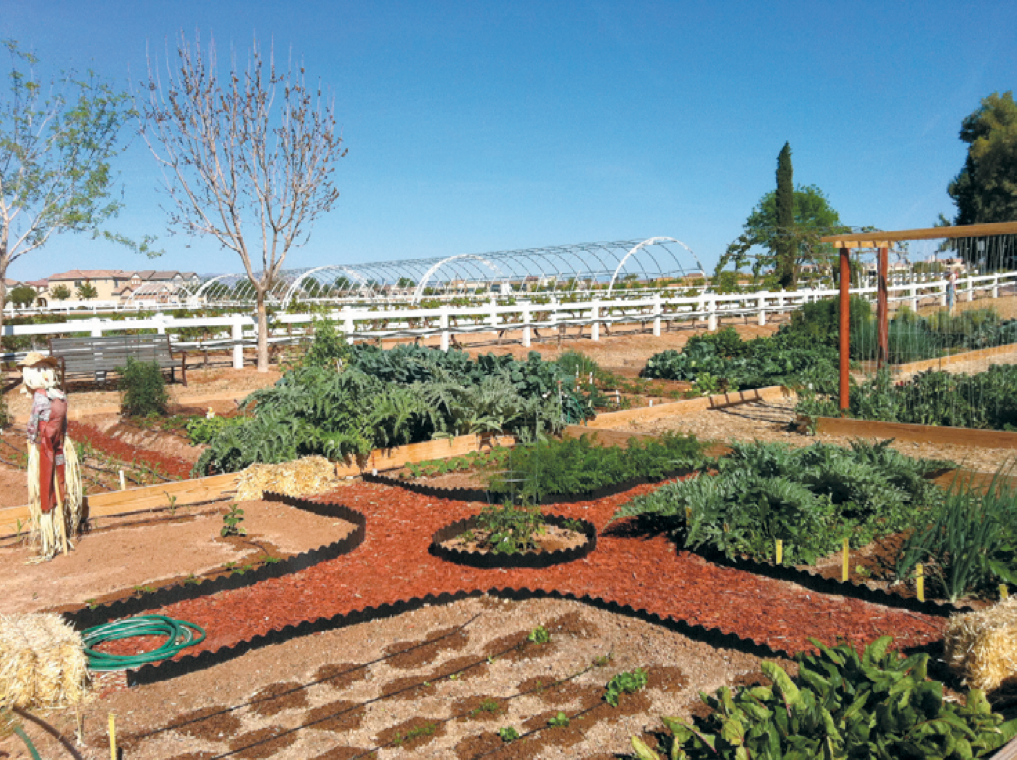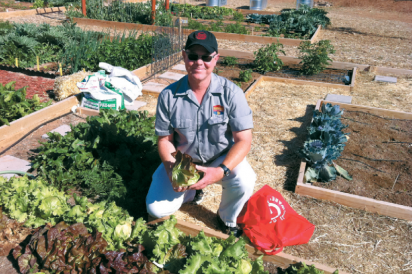Community Gardens Bloom at Agritopia
On a relentlessly sunny, unseasonably hot March afternoon, Gilbert restaurateur Joe Johnston parks his shiny white Vespa next to the new Agritopia community garden and pads across a freshly mulched pathway among neatly laid-out plots. He steps into his own patch of green to pick ripe heads of lettuce from the tidy rows of herbs and vegetables, occasionally saying hi to other gardeners passing by.
Here, everybody knows Johnston–as well they should: The 1.2-acre community garden, along with the surrounding residential development, farm and eateries (Joe's Farm Grill and The Coffee Shop) are all part of Johnston's vision for sustainable agriculture on what had been his father's farm since 1960.
Today's handpicked harvest from Johnston's own community garden plot is just enough to fill a grocery tote with three kinds of salad greens, fennel, Swiss chard and cilantro, but in its own a small way, it's the result of the decades of planning that led to the creation of Agritopia.
While Johnston didn't study agriculture like his brothers Steve (a cattle rancher) and Paul (a farmer), he's certainly figured out how to plant the seeds of ideas, carefully nurture them, and eventually watch them bloom.
"Patience is a huge deal," Johnston says. "Patience has always served me well, because timing is everything."
The family farm was once an expanse of Pima cotton fields rotated with Durum wheat crops that were mostly exported to Italy for making pasta. Back in the mid 1980s, Johnston started the initial land planning after his father gifted the family farm to him and his brothers. They knew there would inevitably be growth in the area because the 202 Freeway was set to pass right through their land (although a downswing in the local real estate market threw development off by 15 years). Johnston came up with the concept for a restaurant that would serve food from the family farm, but concedes that the area was "still the boonies" back then.
In the meantime, the brothers kept the land as an active farm growing alfalfa for dairy cows. Johnston founded the successful Coffee Plantation coffeehouse chain, sold that business in 1993 and went on to open Joe's Real BBQ in downtown Gilbert in 1998.
Eventually, things started to move forward with Agritopia, and he thought long and hard about what kind of community he wanted to live and work in. Instead of simply selling off the land to a developer, Johnston wanted to create a unique housing development that coexisted with sustainable agriculture. He also wanted to grow the kinds of crops that would be consumed in an urban environment.
"No person eats alfalfa," he notes, wryly.
The community garden is the latest fruit of Johnston's labor. A year ago, he was among a dozen people who experimented with Agritopia's first community garden, rent-free, to figure out what could go wrong. The group quickly learned that people needed independent watering systems for their gardens. They also needed well-defined plots and, frankly, some rules.
Then, last September, the official community garden got started with 23 plots–and a huge waitlist. The garden doubled in size, to 46 plots, this past February, and now there are more than 100 participating gardeners.
Less than half of them are actual Agritopia residents, Johnston says, although most live within a five- to 10-mile radius of the Gilbert development, which stretches from the northwest corner of Ray Road and Higley to the curve of the Santan 202 highway.
Johnston says his attempt to grow Indian tobacco didn't work out, but otherwise, the garden's been a swift success. Among the leafy plots, you'll find fava beans, edamame, melons, romanesco, chard, spinach, corn, peppers, tomatoes, fennel, eggplant and more. There's a small shade screen alongside a tool shed in the middle of the grid, and clusters of fresh herbs sprouting from big metal community planters.
A white fence wrapped in gnarled grapevines separates part of the community garden from Agritopia's fully functioning urban farm, Johnston Farms. The farm sells fresh produce to Joe's Farm Grill and its neighboring hangout The Coffee Shop, as well as to the public at a self-serve farm stand that operates on the honor system.
High-value crops like dates and blood oranges are sold to other local businesses such as Sweet Republic ice cream shop, which uses them to create seasonal flavors. Across 15 acres, Johnston Farms has groves of olive trees, stone fruit trees (apricot, plum and peach) and pecan trees, along with a variety of vegetables from tomatoes and onions to beets and squash.
"We cannot say it's 'organic,'" Johnston explains. "But we only use fertilizers that are certified organic, and we don't really use pesticides. We're more in the camp of 'minimal interventionists,' because if we lose 20% of a crop to a beetle, that's not a big deal–it costs more for labor to spray it."
Labor costs are much higher for an urban farm than a traditional one, since multiple crops need to be hand trimmed.
"There's a reason why people mono-crop. My dad could farm 320 acres himself because it's mechanized," he explains. "We've been struggling since day one on what is the appropriate mix of products for this farm. It's definitely a work in progress."
Monetizing the farm has been a challenge. The Johnstons funded it early on; now it's self-sustaining. Vegetables are harvested directly by employees of Joe's Farm Grill. Since the farm saves on post-production labor costs, the restaurant can buy the produce below the market rate.
For the next phase of the garden, there are talks about teaming with individual gardeners to sell their excess crops via the farm stand, the restaurants or perhaps the Gilbert Farmers Market.
Johnston's plan for Agritopia doesn't end there. Besides the productive element of the farm, Johnston also wants it to have educational and aesthetic components. He considers it a local amenity.
As with his other carefully tended ideas, he's got a long-term goal to create a food-focused center on the corner, which is currently a citrus grove. Although he's keeping mum about the specifics of the concept, he does reveal that he intends to put agriculture right next to restaurants, to make a more immediate connection with the food.
In the short term, there's a huge amount of demand for more community garden space, and Johnston is weighing how much he can reduce Agritopia's capacity for farming to meet the demand.
But the possibility of more restaurants coming to the development–and serving food grown onsite–bodes well for the farm.
"People know 'local' is a buzzword, and this will visually make that connection. You can see at least where some of your food is coming from–it's fresh and honest. There's that productive element, and we want to be educating people. And then there's just beauty," Johnston says.
"Plants tend to be beautiful."
AGRITOPIA
Agritopia is located at 3000 E. Ray Rd. in Gilbert, at the northeast corner of Higley and Ray. Visit Agritopia for more information on the development.
Agritopia's Community Garden is currently full, but interested gardeners can contact coordinator Gayle High at 480-988-1238 for details, or email gayle@agritopia.com for an application
The Coffee Shop at Agritopia serves cupcakes and pastries, breakfast items and sandwiches daily. Hours of operation are Monday through Thursday from 6am to 8pm, Friday and Saturday from 6am to 9pm and Sunday from 8am to 4pm. Call 480-279-3144 or visit the website to find out more.
Joe's Farm Grill serves breakfast, lunch and dinner and is open daily from 8am to 9pm. Call 480-563-4745 or visit the website for more information.
The Farm at Agritopia's produce stand is self-serve, self-pay and open 24 hours a day. Located across from The Coffee Shop, it features citrus, dates, stone fruit and surplus vegetables from the farm. To see what's fresh and available, visit The Farm at Agritopia.





